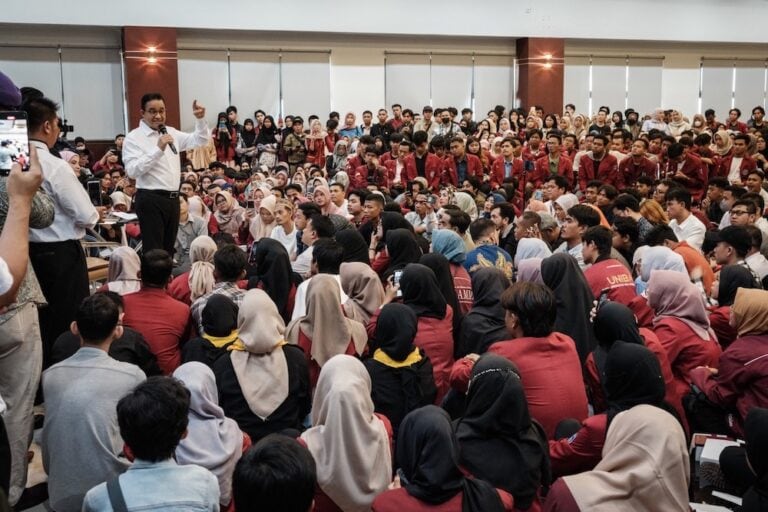Aliansi Jurnalis Independen Indonesia, one of the petitioners, said that journalists have been charged under these "catch-all" laws.
This statement was originally published on aji.or.id on 27 July 2023.
Two human rights activists, Haris Azhar and Fatia Maulidiyanti, as well as two organizations, AJI Indonesia and YLBHI, filed a judicial review of articles on fake news and defamation. These articles are deemed contradictory to freedom of opinion and expression, guaranteed in the 1945 Constitution.
The judicial review was registered at the Constitutional Court on Monday, July 24, 2023, by their lawyers, Themis Indonesia Law Firm, LBH Jakarta, LBH Masyarakat, and the Advocacy Team for Democracy (Tim Advokasi untuk Demokrasi). The relevant articles included Articles 14 and 15 of Law No. 1/1946 (fake news), Article 27 Paragraph (3) Jo. Article 45 Paragraph (3) of the ITE Law, and Article 310 Paragraph (1) of the Criminal Code (defamation).
According to the Petitioners’ lawyer, Shaleh Al Ghifari, these catch-all articles are prone to be misused to criminalize legitimate expression, as currently experienced by the two petitioners, Haris Azhar and Fatia Maulidiyanti. Both were criminalized by the Coordinating Minister for Maritime Affairs and Investment, Luhut Binsar Panjaitan, for expressing their views on the alleged involvement of some high-ranking officials in mining and the deployment of security forces in Papua.
Meanwhile, AJI is responsible for protecting its members who are vulnerable to criminalization while carrying out journalistic duties as a result of these catch-all articles. AJI noted that 38 journalists were criminalized under the ITE Law from 2008-2023, with 28 of them (73.7 percent) reported under Article 27 Paragraph 3 on defamation.
Furthermore, YLBHI, which is in charge of providing legal aid and human rights defense, experiences difficulty defending and providing legal assistance to citizens who are criminalized under these catch-all articles.
“These articles violate freedom of thought and conscience, as well as the freedom to seek and receive information. The Petitioners are harmed because they can be criminalized under these catch-all articles,” said Shaleh Al Ghifari.
Another lawyer, Fandi Denisatria, said that these articles were actually Dutch colonial legacies that were deliberately enforced in the Dutch East Indies, since indigenous people were regarded as being easily provoked and lacking the ability to filter information at the time. In addition, these articles are contrary to the principle of restrictions on human rights, which must be based on proportionality, legality, and participation (three-part test).
Furthermore, the Petitioners asked the Constitutional Court to temporarily suspend the enforcement of the articles while the case was being heard because it had harmed the petitioners’ constitutional rights, especially Haris and Fatia, who are still being tried at the East Jakarta District Court.
Themis Indonesia Law Firm, LBH Jakarta, LBH Masyarakat, YLBHI, AJI, and Advocacy Team for Democracy (Tim Advokasi untuk Demokrasi)
Contact Person:
Shaleh Al Ghifari, Fandi Denisatria, Sasmito Madrim.
Attachment
Articles challenged for judicial review to the Constitutional Court
| Articles | Contents |
| Article 14 of the Law No 1/1946 | 1. Any person, by spreading fake information or news, intentionally causes public unrest, shall be sentenced with imprisonment at a maximum of ten years.
2. Any person who publishes news or making information which may cause public unrest, while it can reasonably be suspected that such news or information is fake, shall be sentenced with imprisonment at the maximum of three years. |
| Article 15 of the Law No 1/1946 | Any person who publishes news that is uncertain or exaggerated or incomplete, while it is understood or at least reasonably suspected that such news may cause or is already causing public unrest, shall be sentenced with imprisonment at the maximum of two years. |
| Article 310 Paragraph (1) of the Criminal Code | The person who intentionally harm someone’s honor or reputation by charging him with a certain matter, with the obvious intent to give publicity thereof, shall, being guilty of defamation, be punished by a maximum imprisonment of nine months or a maximum fine of Rp4.500,- (four thousand five hundred rupiah). |
| Article 27 Paragraph (3) of the IET Law
|
Any person who knowingly and without authority distributes and/or transmits and/or causes to be accessible Electronic Information and/or Electronic Records with contents of affronts and/or defamation. |
| Article 45 Paragraph (3) of the IET Law | Any person who knowingly and without authority distributes and/or transmits and/or causes to be accessible Electronic Information and/or Electronic Records with contents of affronts and/or defamation as intended by Article 27 27 Paragraph (3) shall be sentenced to imprisonment not exceeding 4 (four) years and/or a fine not exceeding Rp750.000.000,00 (seven hundred and fifty million rupiah). |



